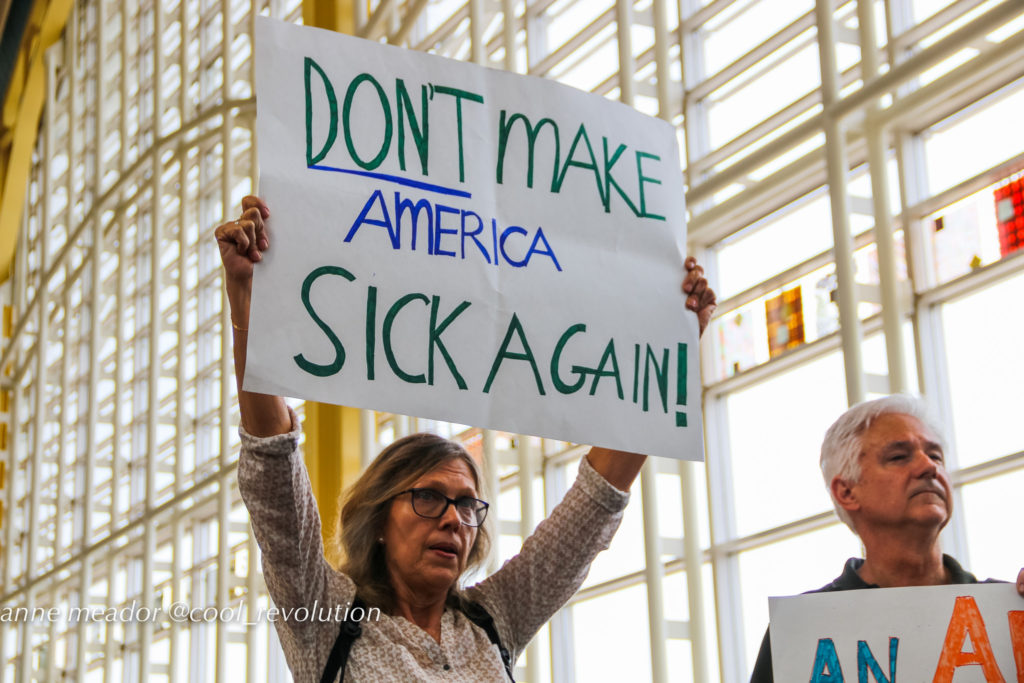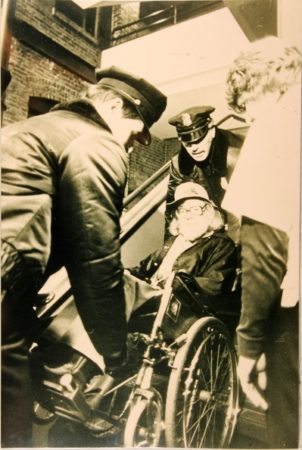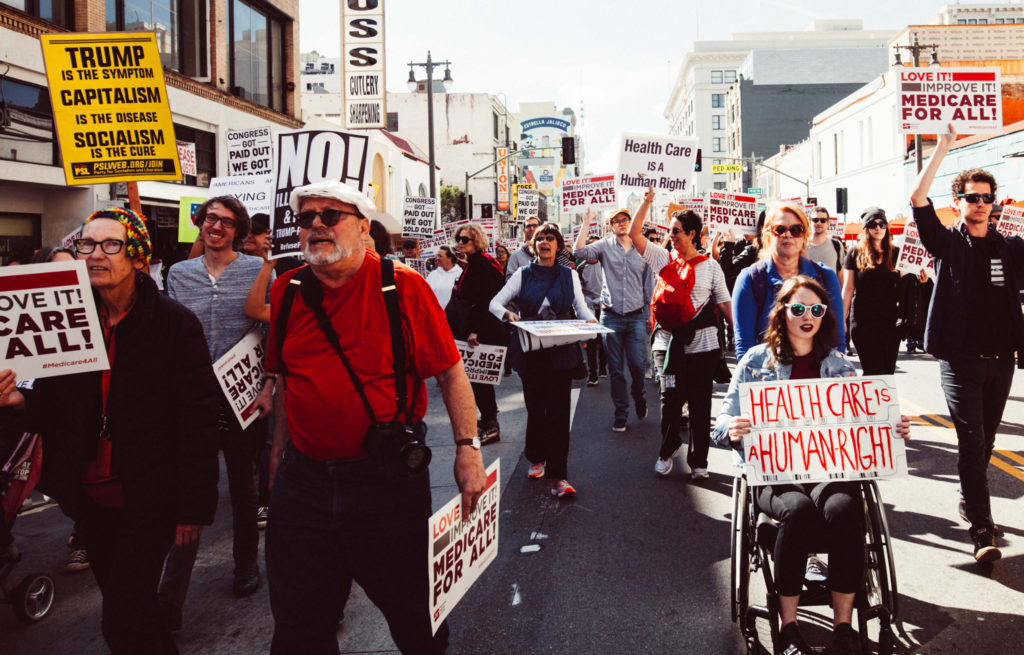Kit O’Connell and Eleanor Goldfield co-wrote this segment of Act Out!
They’re loud, they’re fierce, and they’d rather risk death than see their — and your — health care get cut.
You’ve probably seen stories about protesters torn from their wheelchairs as they shut down Senators’ offices, resisting the devastating new Republican “health care” plan that would push even more people into ill health, bankruptcy and death.
To give you a rough idea of how many — there are currently about 29 million people uninsured under the ACA — although many who are insured still suffer from the economic burdens of trying to stay alive. That number may drop a bit by 2026 but under the proposed AHCA, revised or not, more than 50 million people would be uninsured. And we’ll get to what third option would leave no one insured but first, let’s circle back to these protests.

Organized under the hashtag #ADAPTandResist, they have spread across the U.S., from Capitol Hill to legislator’s offices around the country. We’ve all been justifiably horrified to see people defending their right to health care literally dragged to jail, and sometimes bloodied in the process. But as with anyone who places their body squarely in the path of the powers that be, these protesters don’t want our pity, they want our solidarity — because this is a struggle we should all take part in.
They also aren’t new to this struggle either — actually, disability rights advocates from groups like ADAPT are some of the fiercest, and most effective activists around, and they’ve literally transformed the world you live in, to everyone’s benefit.
https://twitter.com/costlylovewins/status/887788433304936449
In today’s New Old News, we’re going to look back at the history of the struggle for accessibility and equal rights for the disabled, and why we should all get involved with their fight — our fight — today.
The fact that disabled people are able to move with relative freedom through most modern cities, and easily access education, housing, and shopping, is thanks to decades of direct action and tireless political lobbying. And whether you know it or not, you or someone you love lives a better life because of it.

Most historians pinpoint the beginning of the disability rights movement in the 1960s, and to Edward Roberts, a pioneering disabled student at the University of California at Berkeley who used an iron lung at the campus hospital at nights and during the day, had a respirator attached to his wheelchair.
While earning a bachelor’s degree and a master’s degree, Mr. Roberts helped fellow students to organize into a self-help group whose services included free counseling, off-campus housing referrals and an expert wheelchair repair crew … He also taught political science at the university for six years. — “Obituary: Edward V. Roberts, 56, Champion of the Disabled,” The New York Times
In the 70s, he founded the Center For Independent Living, a vital resource that helps disabled people live fuller lives, travel more freely around their communities, and lobbies for better laws.
And yet, despite the efforts of people like Roberts, by the 1980s most disabled people were still trapped in nursing homes or lived with family and barely left their houses — there simply weren’t enough services, housing, or accessible facilities and transportation for them to have any other options. —- That’s where groups like ADAPT, which originally stood for Americans Disabled for Accessible Public Transit, came into play. The first city to cave to the pressure and promise all accessible bus fleets was Denver — a promise that came only after a dramatic series of public transit shutdowns when other forms of negotiation proved fruitless.
Here’s an account from the Denver Post:
In the early morning of Wednesday, July 5, 1978, protesters waited for an RTD bus. It rolled to a stop at Broadway and Colfax Avenue, one of the busiest intersections in the state. Within seconds, it was swarmed as people in wheelchairs blocked both front and back. The group, then called Atlantis, had been talking to RTD for more than a year trying to get wheelchair lifts added to all buses. A new fleet had just been released, but none was accessible. People were angry. Another bus pulled behind the first. Protesters surrounded it, too, locking both in place. Traffic stalled for miles. Police of increasing rank would come, demanding that the group disperse. But the protesters — known as the Gang of Nineteen — didn’t budge for two days. Not until RTD agreed to add lifts. It was the first public transit agency in the nation to do so.
In other words, the buses in your city likely have wheelchair lifts because ADAPT was willing to shut down traffic until cities realized it was easier to accommodate them than deal with their constant protests. Insert parallel to any progressive battle won against a stagnant system here.
In another famous example, ADAPT & their friends successfully pressured Congress to pass the Americans with Disabilities Act. The bill had become stalled at the House Committee on Public Works and Transportation, and so on March 12, 1990 dozens of ADAPT protesters, out of hundreds present at a rally, left their wheelchairs behind and began literally fucking crawling up the steps of the Capitol. Here’s how the blog “History by Zim” describes the famous “Capitol Crawl:”
…over 60 activists abandoned their wheelchairs and mobility devices and began crawling the 83 stone steps up to the U.S. Capitol Building during which people were loudly chanting “What do we want?” “ADA!” “When do we want it?” “NOW!” …
“I want my civil rights,” Paulette Patterson of Chicago stated as she was inching her way to the top. “I want to be treated like a human being.”
Eight-year-old Jennifer Keelan was famously taped … while crawling up the stairs. “I’ll take all night if I have to,” she firmly stated.
When it finally passed later that session, the ADA would revolutionize the lives of disabled people, allowing them to force almost any business or institution to make reasonable accommodations for their access, whether that’s the corner burger joint, a university, or a hospital. Even prisons and police have to respect the bodily autonomy of the disabled and allow them access to mobility devices, or interpreters for the deaf thanks to laws like the ADA.
He had them sent to jail without their wheelchairs clearly Senator Portman doesn't care! #ADAPTandRESIST pic.twitter.com/PkYgXzVJro
— American Disabled for Attendant Programs Today (@NationalADAPT) July 7, 2017
That’s another reason the sight of activists being dragged out of their wheelchairs is alarming: it not only puts their lives at risk, but also breaks the law.
Despite numerous tangible victories like bus lifts and the ADA, ADAPT has kept protesting, demanding better health care, expansions to medicare, and other changes to laws that guarantee their freedom. And they’ve done it by being willing to put their bodies on the line, again and again.
And that’s where all of us come in. I’ve talked before about intersectionality, the importance of realizing that our causes are connected, and that we can build each other up by working together. I’ve also talked about how white people like me need to use our privilege when we can, to support causes like Black Lives Matter. But privilege is not just about skin color — privilege is a spectrum that includes everything from place of birth to yes, physical capabilities. Able bodied privilege is all too often overlooked on the left — even many marches and protests only consider accessibility as an afterthought, if at all. We have to do better, and we need to recognize that elevating disability rights helps all of us, even if we’re healthy and able-bodied now. Besides, we’re all going to get old or sick someday, and do you really want to spend your last moments in a prison-like nursing home, if they could be spent instead in your own home?
Inside Senator Sullivan's office you can hear "No Cuts to Medicaid!" Senator Sullivan are you listening? #ADAPTandRESIST pic.twitter.com/xKRmkoLn6P
— American Disabled for Attendant Programs Today (@NationalADAPT) July 6, 2017
Remember though, if you do join this cause, to center the work of the sick and disabled and let them lead. They’re experienced, and it’s their fight first and foremost. One of the mottos of the disability rights struggle is “Nothing about us without us.” Oh, and incidentally, this segment’s primary author, Kit O’Connell, is a disabled journalist.
The work that the health care protesters are doing is for all of us, and they can’t win this fight alone. If Trumpcare – any version – passes, millions will lose insurance, sick people will lose access to health care because of pre-existing conditions, and millions of disabled people could lose the services that help them live independent lives. The GOP plan includes more than $800 billion in cuts to medicaid in the form of per capita caps – meaning “…the amount of money that the federal government provides to states would be capped, or limited, to a certain fixed amount per Medicaid recipient, based on 2016 spending levels.”
.@SenToomey quit hiding from your constituents. Save our life & liberty. #NoBCRA #NoCapsNoCuts #SaveHCBS #SaveMedicaid #ADAPTandResist pic.twitter.com/aaSpOcyJyi
— American Disabled for Attendant Programs Today (@NationalADAPT) July 3, 2017
The announced goal of this is to save the federal government money for more important things, you know like, bombing people. But here’s what that really means: “As the nation’s primary source of funding for the services that help people with disabilities stay in their own homes, Medicaid plays a vital role in protecting Americans with disabilities from institutionalization.”
And again, the Affordable Care Act is very far from the perfect solution to our healthcare problems — it’s expensive, complicated, and puts too much money in the hands of corrupt insurance companies. Jessica Lehman, the executive director of Senior and Disability Action, explained the situation in San Francisco:
San Francisco seniors, people with disabilities and our children and families are hurting under our current health care system. People are facing exorbitant co-pays and premiums, lack of access to doctors and vital services that are not covered at all — from mental health, to wheelchairs, to home care. The cost of living is so high in San Francisco that people are going without the health care that they desperately need.
And San Francisco is not alone. As the cost of living continues to rise across the country, more and more people are finding themselves unable to partake in the supposedly affordable and caring ACA. The ACA is shitty – the AHCA is fucking horrific. Indeed, the only solution that leaves no one uninsured and covers all healthcare related costs is medicare for all. Imagine a system that provides unconditional healthcare for everyone – from birth to death.
It’s not that far-fetched – countries around the world do it and manage to somehow keep from falling into an abyss of economic disaster. I mean, it could have something to do with the fact that they’re not spending 31% of their healthcare costs on trying to maintain a broken system. We pour $500 billion a year into administrative costs that are specifically designed to keep people away from the care that they need. Yes – we literally pay to keep people sick.
We can and need to do a lot better. We’ll dive more into the subject of single payer next week as we near Medicare’s birthday on July 30th but for now, here’s a brief recap on the Medicare for All battle; our interview with Dr. Margaret Flowers.
To see the full interview with Margaret Flowers, check out the link below and in the video description (http://bit.ly/ActOut84) and for more on the Medicare for All battle, visit healthoverprofit.org.
And if you’re sitting there healthy and able bodied thinking that this doesn’t concern you — it does. Even if you somehow miraculously go through life without ever needing healthcare, do you really want to contribute to a system that keeps disabled people in fucking institutions?
Or dumps them like fucking trash, as was the case in 2007 in Los Angeles when several hospitals were under investigation for “dumping” homeless patients onto the streets. These patients — many of them not only physically but also mentally ill — were driven in ambulances contracted by the hospitals and abandoned on the streets of the neighborhood known as Skid Row, an area in downtown Los Angeles where literally thousands of homeless people crowd in order to try and take advantage of the overcrowded shelters and assistance programs. In one case in 2014, a 38 year old woman, homeless and battling drug addiction, was wearing a hospital gown. Her only possession was a note with an 800 number and the definition of schizophrenia.

THAT — is the kind of system that we live in. We spend hundreds of billions of dollars a year to make sure that that woman gets dumped on the streets of Los Angeles in a fucking hospital gown, to make sure that that person doesn’t get a wheelchair because fuck them. To make sure that that kid dies of cancer because also fuck him. Why would you want to live in that system — that drags people from wheelchairs because they had the gall to say that they want autonomy over their bodies and their lives?
Regardless of whether we’re healthy or sick, able-bodied or disabled, we can fight. And we can put our bodies on the line, for something better that benefits us all.
 Using Able-Bodied Privilege To Defend Healthcare & Human Rights by Kit O’Connell and Eleanor Goldfield is licensed under a Creative Commons Attribution 4.0 International License.
Using Able-Bodied Privilege To Defend Healthcare & Human Rights by Kit O’Connell and Eleanor Goldfield is licensed under a Creative Commons Attribution 4.0 International License.
Based on a work at https://kitoconnell.com/2017/07/20/disability-able-bodied-privilege/.